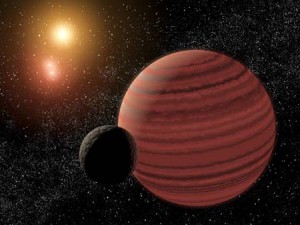This year we have 11 projects available for participating Morehouse & Spelman students in the following topics:
- Experimental Astrophysics: Profs. Keating, Murphy & Wright
- Observational Astrophysics: Profs. Burgasser, Konopacky & Melis
- Experimental Biophysics: Prof. Schoetz Collins
- Experimental Condensed Matter Physics: Profs. Averitt, Basov & Maple
- Theoretical Condensed Matter Physics: Prof. Arovas
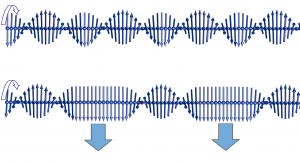 Chiral Magnets and Graphene Structure
Chiral Magnets and Graphene Structure
Prof. Daniel Arovas (Theoretical Condensed Matter Physics)
Project Description: Prof. Arovas seeks a research student interested in studying the theoretical aspects of unique physical materials. Specifically, the student will work on one of two projects: (a) Monte Carlo simulations of skyrmion lattice formation in chiral magnets, of (b) diagonalization of decorated graphene Hamiltonians.
Requirements: Students should have completed at least an introductory Physics sequence, but no formal theory training is required.
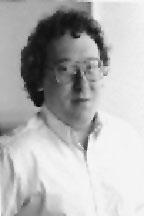 Brief Biography: Prof. Arovas is a theorist interested in strongly correlated quantum systems, particularly in low dimensions where quantum fluctuations can lead to interesting and exotic new states of matter. He has also studied the effects of disorder and spin-orbit coupling on transport in the quantized Hall regime, and on some related problems of localization physics.
Brief Biography: Prof. Arovas is a theorist interested in strongly correlated quantum systems, particularly in low dimensions where quantum fluctuations can lead to interesting and exotic new states of matter. He has also studied the effects of disorder and spin-orbit coupling on transport in the quantized Hall regime, and on some related problems of localization physics.
Webpage: http://physics.ucsd.edu/research/condensed_matter
 Characterizing Artificial & Quantum-based Materials
Characterizing Artificial & Quantum-based Materials
Prof. Richard Averitt (Experimental Condensed Matter Physics)
Project Description: Prof. Averitt is seeking a research student to physically characterize artificial metamaterials and quantum materials (superconductors, ferromagnets, etc.) using novel optical spectroscopic approaches. You will learn to use advanced optical spectroscopic experimental techniques used to characterize new materials, and the solid-state physics that describes them.
Requirements: Students should have completed at least an introductory E&M course (junior standing preferred), and some experience with optics is preferred but not required.
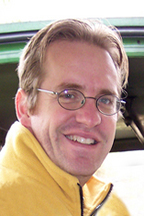 Brief Biography: Prof. Averitt uses advanced experimental techniques, including time-resolved spectroscopy from the far-infrared to the visible, to characterize the fundamental and technologically relevant properties of interesting materials, such as artificial (metamaterial) and quantum-based materials. His lab also designs, fabricates, and characterizes artificial materials.
Brief Biography: Prof. Averitt uses advanced experimental techniques, including time-resolved spectroscopy from the far-infrared to the visible, to characterize the fundamental and technologically relevant properties of interesting materials, such as artificial (metamaterial) and quantum-based materials. His lab also designs, fabricates, and characterizes artificial materials.
Webpage: http://physics.bu.edu/averittlab/
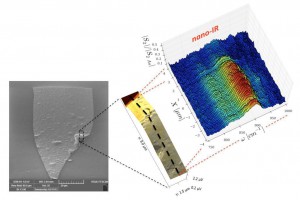 Infrared Spectroscopy of Novel Electronic and Magnetic Materials
Infrared Spectroscopy of Novel Electronic and Magnetic Materials
Prof. Dmitri Basov (Experimental Condensed Matter Physics)
Project Description: Prof. Basov is seeking a research student to conduct investigations into the physics of novel electronic and magnetic materials using infrared spectroscopic techniques. Among several projects, research students may investigate strongly correlated electron systems, magnetic semiconductors, molecular and organic nano-electronics, electromagnetic metamaterials, superconductivity, memristive systems, charge dynamics and Dirac plasmons in graphene, topological insulators, development of novel spectroscopic instrumentation, infrared nano-spectroscopy of Extraterrestrial Materials, and near-field infrared imaging at cryogenic temperatures. Focus will be on laboratory skill development and the physics of novel materials.
Requirements: Students should have a strong motivation to develop their physics understanding and research skills.
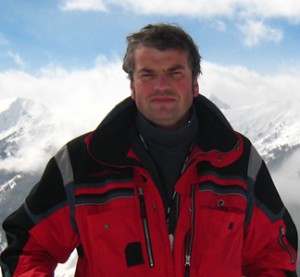 Brief Biography: Prof. Basov is a professor and Chair of the Physics Department at UCSD. His research interests include: physics of correlated electron systems, superconductivity, two-dimensional materials, and infrared nano-optics. He has received numerous prizes and awards, including a Sloan Fellowship (1999), Genzel Prize (2014),
Brief Biography: Prof. Basov is a professor and Chair of the Physics Department at UCSD. His research interests include: physics of correlated electron systems, superconductivity, two-dimensional materials, and infrared nano-optics. He has received numerous prizes and awards, including a Sloan Fellowship (1999), Genzel Prize (2014),
Humboldt research award (2009), and Moore Investigator (2014).
Webpage: http://infrared.ucsd.edu/
Prof. Adam Burgasser (Observational Astrophysics)
Project Description: Prof. Burgasser is seeking 1-2 research students to work on the SpeX Prism Library Analysis Toolkit (SPLAT), developing analysis tools to investigate low-resolution near-infrared spectra of cool brown dwarfs. You will learn how to reduce and analyze astronomical spectral data, and develop software in Python to search for and characterize rare populations, including metal-poor subdwarfs, young planetary-mass brown dwarfs, and spectral binaries.
Requirements: Some programming experience (Python preferred but not required); completion of Mechanics and E&M courses; some experience/knowledge of optics preferred but not required.
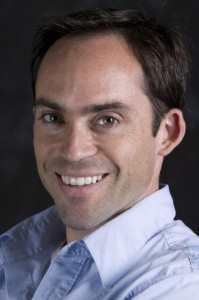 Brief Biography: Prof. Burgasser’s research is observational astrophysics, focusing on the atmospheres and physics properties of the lowest-mass stars, brown dwarfs and extrasolar planets. His tools include optical and near-infrared spectroscopy, photometric and spectroscopic monitoring, high-resolution imaging, and radio interferometry.
Brief Biography: Prof. Burgasser’s research is observational astrophysics, focusing on the atmospheres and physics properties of the lowest-mass stars, brown dwarfs and extrasolar planets. His tools include optical and near-infrared spectroscopy, photometric and spectroscopic monitoring, high-resolution imaging, and radio interferometry.
Webpage: http://coolstarlab.org
 Dark Matter and the Cosmic Microwave Background
Dark Matter and the Cosmic Microwave Background
Prof. Brian Keating (Experimental Astrophysics)
Project Description: Dr. Keating is seeking 1-2 research students to work on a new high-resolution spectrometer and polarimeter for UCSD’s TRITON-Cam radio telescope, which will be used to detect Dark Matter in the Milky Way. Researchers will learn about cosmology and the physics of dark matter, electronics and radio/microwave spectropolarimetry techniques. By the end of the summer, researchers will use their spectrometer to measure the Milky Way’s rotation curve in H I, prepare a report on their work, and present their research at the UCSD Summer Research Conference.
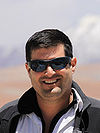 Brief Biography: Prof. Keating is an observational and experimental cosmologist, using novel detectors to measure the polarization and temperature variations of the Cosmic Microwave Background, and cosmological reionization. He is PI of the Simons Array on the POLARBEAR Telescope in the Atacama Desert, and collaborator on the BICEP and CIBER projects.
Brief Biography: Prof. Keating is an observational and experimental cosmologist, using novel detectors to measure the polarization and temperature variations of the Cosmic Microwave Background, and cosmological reionization. He is PI of the Simons Array on the POLARBEAR Telescope in the Atacama Desert, and collaborator on the BICEP and CIBER projects.
Webpage: http://cosmology.ucsd.edu/
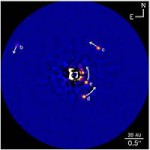 Atmospheres of Extrasolar Planets and Young Binary Stars
Atmospheres of Extrasolar Planets and Young Binary Stars
Prof. Quinn Konopacky (Observational Astrophysics)
Project Description: Prof. Konopacky is seeking a student to work on one of two projects: (1) analyze new imaging and spectroscopic data from the Gemini Planet Imager (GPI) for directly detected exoplanets; or (2) analyze spectroscopic data on young low mass stars in the Orion Nebula Cluster. You will gain knowledge about astronomical data reduction techniques and the science of extrasolar planets and star formation.
Requirements: Some programming experience preferred but not required.
 Brief Biography: Prof. Konopacky’s research in observational astrophysics focuses on star and planet formation and evolution as probed through ground based high angular resolution techniques. She is a member of the commissioning and science team for GPI.
Brief Biography: Prof. Konopacky’s research in observational astrophysics focuses on star and planet formation and evolution as probed through ground based high angular resolution techniques. She is a member of the commissioning and science team for GPI.
Webpage: http://di.utoronto.ca/~konopacky/
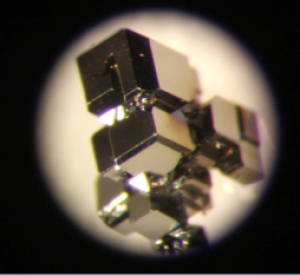 Studying the interplay between superconductivity and magnetism in novel materials
Studying the interplay between superconductivity and magnetism in novel materials
Prof. M. Brian Maple (Experimental Condensed Matter Physics)
Project Description Prof. Maple is seeking 1-2 research students to investigate physical phenomena arising from correlated electron effects in novel materials, including superconductivity, magnetism, and quantum criticality. The interested student will be involved in the synthesis of single crystalline specimens of unique d– or f-electron compounds, and the characterization of these compounds through x-ray diffraction and physical properties measurements such as electrical resistivity, magnetization, and specific heat as a function of temperature, pressure, and magnetic field. This experimental experience will include making measurements at millikelvin temperatures and megabar pressures, and will provide the opportunity to develop a deep understanding of the fundamental properties of matter.
Requirements: Students should have completed a course in introductory physics.
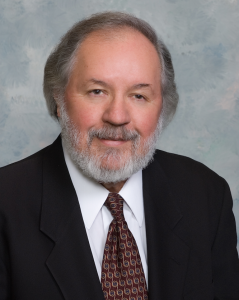 Brief Biography: M. Brian Maple’s research is focused upon correlated electron phenomena in novel d– and f-electron materials, including high-temperature superconductivity, unconventional types of superconductivity, valence fluctuation and heavy fermion behavior, quantum criticality, and exotic types of magnetism. Other research interests include surface science and matter under extreme conditions. Research activities in his laboratory include synthesis of materials in bulk and thin film form, single crystal growth, characterization of materials, and transport, thermal, and magnetic measurements as a function of temperature (into the millikelvin range), pressure (up to the megabar region), and magnetic field (up to 10 tesla).
Brief Biography: M. Brian Maple’s research is focused upon correlated electron phenomena in novel d– and f-electron materials, including high-temperature superconductivity, unconventional types of superconductivity, valence fluctuation and heavy fermion behavior, quantum criticality, and exotic types of magnetism. Other research interests include surface science and matter under extreme conditions. Research activities in his laboratory include synthesis of materials in bulk and thin film form, single crystal growth, characterization of materials, and transport, thermal, and magnetic measurements as a function of temperature (into the millikelvin range), pressure (up to the megabar region), and magnetic field (up to 10 tesla).
Webpage: http://mbmlab.ucsd.edu/
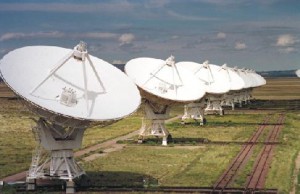 Radio Astrometry and Variability of Nearby Stars
Radio Astrometry and Variability of Nearby Stars
Dr. Carl Melis (Observational Astrophysics)
Project Description: Dr. Melis is seeking a research student to analyze radio inferometry data of low mass stars observed with the Very Large Array and Very Large Baseline Array, to investigate variability associated with magnetic fields and to make ultraprecise (µarcsecond) astrometric measurements for distances and binary orbit determinations. You will learn about magnetic activity and radio generation in cool stars, the radio interferometry technique, and how to interpret radio data using electromagnetic physics principles.
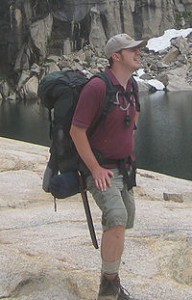 Brief Biography: Dr. Melis is a research scientist at UCSD whose research focuses on the birth, life, death, and re-birth of planetary systems with an emphasis on terrestrial (Earth-like) planets. He uses radio interferometry to study disks and magnetic activity around cool stars, and for precision astrometry.
Brief Biography: Dr. Melis is a research scientist at UCSD whose research focuses on the birth, life, death, and re-birth of planetary systems with an emphasis on terrestrial (Earth-like) planets. He uses radio interferometry to study disks and magnetic activity around cool stars, and for precision astrometry.
Webpage: http://cass.ucsd.edu/~cmelis/index.shtml
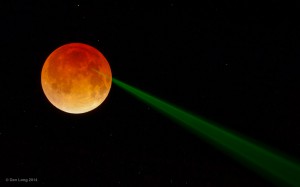 Precision Timing for Lunar Laser Ranging
Precision Timing for Lunar Laser Ranging
Prof. Thomas Murphy (Experimental Astrophysics)
Project: Precision Timing for Lunar Laser Ranging
Project Description: The APOLLO project tests General Relativity by measuring the shape of the Moon’s orbit to millimeter precision. This measurement relies on a clock that is steered by a time solution derived from GPS satellites. The adjustments are a bit bumpy, so Prof. Murphy is seeking a student who will develop a method for smoothing out the bumps, thereby improving the project’s data quality.
Requirements: The tasks will be primarily carried out in the Python programming language; some programming experience preferred.
 Brief Biography: Prof. Murphy is an experimental astrophyicist conducting an ultra-precise test of General Relativity using the technique of lunar laser ranging: bouncing a laser pulse from the Apache Point 3.5m Telescope off of retro-reflector arrays place on the Moon by Apollo astronauts. He also conducts research in the physics of energy and energy systems.
Brief Biography: Prof. Murphy is an experimental astrophyicist conducting an ultra-precise test of General Relativity using the technique of lunar laser ranging: bouncing a laser pulse from the Apache Point 3.5m Telescope off of retro-reflector arrays place on the Moon by Apollo astronauts. He also conducts research in the physics of energy and energy systems.
Webpage: http://physics.ucsd.edu/~tmurphy/apollo/apollo.html
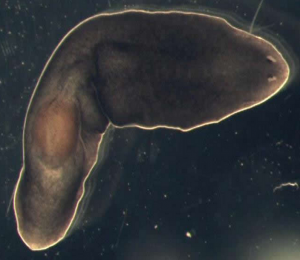 Characterizing Artificial & Quantum-based Materials
Characterizing Artificial & Quantum-based Materials
Prof. Eva-Maria Schoetz Collins (Experimental Biophysics)
Project Description: Prof. Collins is seeking a student to help with a project on neuronal control of behavior in freshwater planarians. Specifically, we are interested in the restoration of motor function during brain regeneration. The project combines behavior experiments, image and data analysis in Matlab, and cellular and molecular biology techniques to understand the molecular mechanisms underlying neuronal regeneration.
Requirements: Familiarity with Matlab and image analysis.
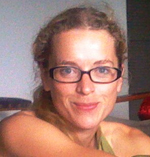 Brief Biography: Dr. Collins’s group investigates the role of physical principles for living systems, focusing on three major areas: biomechanics, asexual reproduction, and behavior and memory. They use techniques such as micro- and macrorheology, in vivo imaging, and force traction microscopy, and combine them with molecular biology methods to investigate how structure and function influence developmental processes, regeneration, and asexual reproduction.
Brief Biography: Dr. Collins’s group investigates the role of physical principles for living systems, focusing on three major areas: biomechanics, asexual reproduction, and behavior and memory. They use techniques such as micro- and macrorheology, in vivo imaging, and force traction microscopy, and combine them with molecular biology methods to investigate how structure and function influence developmental processes, regeneration, and asexual reproduction.
Webpage: http://schoetzlab.ucsd.edu/
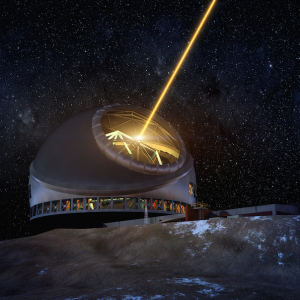 Instrumentation for the Thirty Meter Telescope
Instrumentation for the Thirty Meter Telescope
Prof. Shelley Wright (Experimental Astrophysics)
Project Description: Prof. Wright is seeking a student to participate in the development and investigation of science cases for the first light instrument, IRIS, for the future Thirty Meter Telescope. You will learn about near-infrared astronomical imaging, unique spectroscopic techniques like integral-field spectroscopy, and adaptive optics; and develop programming skills and data reduction and analysis techniques. You will work with a data simulator and investigate in detail science cases for IRIS on potential topics like first-light galaxies, gravitational-lensed galaxies, nearby galaxies, microlensing, and Solar System objects. Depending on the timing of the project and instrumental progress, there may also be an opportunity to work on instrumentation testing and research for IRIS in the laboratory.
Requirements: Two years of coursework in any physical science or engineering major.
 Brief Biography: Prof. Wright’s research is in experimental and observational astrophysics, focusing on the dynamics and chemical abundance histories of galaxies in the early Universe. She is Project Scientist of IRIS, and also develops instrumentation for the Search for Extraterrestrial Intelligence (SETI).
Brief Biography: Prof. Wright’s research is in experimental and observational astrophysics, focusing on the dynamics and chemical abundance histories of galaxies in the early Universe. She is Project Scientist of IRIS, and also develops instrumentation for the Search for Extraterrestrial Intelligence (SETI).
Webpage: http://dunlap.utoronto.ca/~saw


